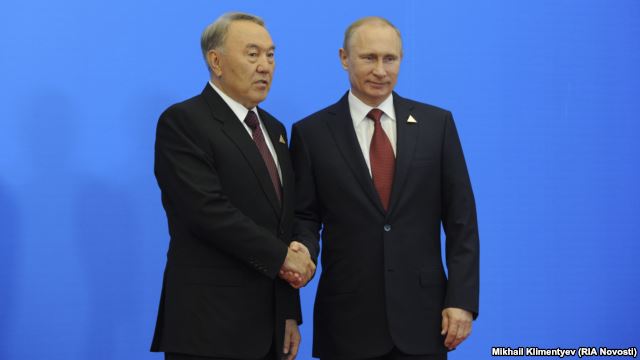 The Kazakh government has a delicate balancing act between Russia and China, according to an opinion article by David Clark in The New Statesman, Britain’s weekly current affairs magazine, on August 4.
The Kazakh government has a delicate balancing act between Russia and China, according to an opinion article by David Clark in The New Statesman, Britain’s weekly current affairs magazine, on August 4.
Clark, who is founder and editor of the blog site Shifting Grounds, said the fallout from Ukraine poses a particular challenge for Kazakhstan, which for the last 20 years has pursued the most nuanced and successful foreign policy of all the former Soviet states.
Kazakhstan, which shares a border with Russia and counts a large number of ethnic Russians among its population, has responded to the Ukraine crisis without taking sides. Not wanting either to antagonise Moscow or allow a precedent for border revisions to become established, President Nazarbayev expressed “understanding” over Russia’s annexation of Crimea while calling for Ukraine’s territorial integrity to be preserved as part of a negotiated settlement.
As noted by Clark in his article, this is consistent with the careful balancing act Kazakhstan has managed to achieve since independence. Its diplomacy has aimed to turn what would otherwise be a vulnerable geopolitical position as a land-locked, resource rich nation, wedged between two great powers, into a source of diplomatic strength.
Kazakhstan’s President Nursultan Nazarbayev, Clark explained, advocates Eurasianism as an expression of his country’s identity as a crossroads between continents and cultures, not an invitation to restore a privileged sphere of Russian influence, as some in the West have supposed.
Kazakhstan considers the Eurasian Union as a purely economic partnership, and not necessarily its most important one in the light of recent trends, writes Clark. With Russia entering what may prove to be a prolonged period of stagnation, stronger ties to an economically dynamic China provide better prospects for growth and investment.
As for China, Clark said, it has become a major investor in the Kazakhstan’s energy sector through the purchase of companies like Petrokazakhstan and Mangistau Munai Gas by the China National Petroleum Company. The construction of pipelines carrying oil and gas supplies to China have reduced Kazakhstan’s dependence on a Soviet-era pipeline network that previously tied it to Russia.
The developing economic relationship with China is increasingly about much more than the export of natural resources. According to Clark, the two countries are now major partners in delivering China’s vision of a New Silk Road connecting Europe and Asia through an expanding web of modern rail, road, telecommunications and energy links.
As for the Western ‘vector’ of Kazakhstan’s foreign policy, Clark said it remains important, but not as strong as it was in the immediate aftermath of independence when the United States became its leading foreign investor.
What is more, South Korea is becoming an important commercial partner and efforts are being made to cultivate ties with the Arab Gulf states. Also, South Asia is another region of growing interest with Kazakhstan strongly supporting India and Pakistan’s accession to the Shanghai Cooperation Organisation, according to Clark.
This means Kazakhstan’s Eurasian integration is destined to stop short of the point where Russian hopes of reclaiming an exclusive leadership role can be realised and Russian President Vladimir Putin knows that forcing the issue would cause a breach with China, a country whose good will he needs to offset Russia’s isolation from the West, according to Clark.
www.neurope.eu, 07.08.2015




